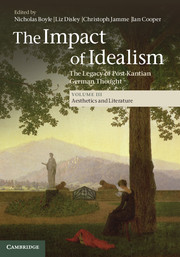Book contents
- Frontmatter
- Contents
- List of Illustrations
- List of Contributors
- Acknowledgements
- List of Abbreviations
- Introduction: Idealism in aesthetics and literature
- 1 The legacy of Idealism and the rise of academic aesthetics
- 2 Hegel's philosophical theory of action: the concept of action in Hegel's practical philosophy and aesthetics
- 3 Tragedy and the human image: German Idealism's legacy for theory and practice
- 4 Romanticism as literary Idealism, or: a 200-year-old way of talking about literature
- 5 Idealism in nineteenth-century German literature
- 6 Idealism in nineteenth-century British and American literature
- 7 Elements of Schopenhauer's thought in Beckett
- 8 German Idealism and the philosophy of music
- 9 The music of German Idealism
- 10 ‘Refiner of all human relations’: Karl Friedrich Schinkel as an Idealist theorist
- 11 Influences of German Idealism on nineteenth-century architectural theory: Schelling and Leo von Klenze
- 12 ‘Making a world’: the impact of Idealism on museum formation in mid-nineteenth-century Massachusetts
- 13 Hegel, Danto and the ‘end of art’
- Bibliography
- Index
- References
12 - ‘Making a world’: the impact of Idealism on museum formation in mid-nineteenth-century Massachusetts
Published online by Cambridge University Press: 05 December 2013
- Frontmatter
- Contents
- List of Illustrations
- List of Contributors
- Acknowledgements
- List of Abbreviations
- Introduction: Idealism in aesthetics and literature
- 1 The legacy of Idealism and the rise of academic aesthetics
- 2 Hegel's philosophical theory of action: the concept of action in Hegel's practical philosophy and aesthetics
- 3 Tragedy and the human image: German Idealism's legacy for theory and practice
- 4 Romanticism as literary Idealism, or: a 200-year-old way of talking about literature
- 5 Idealism in nineteenth-century German literature
- 6 Idealism in nineteenth-century British and American literature
- 7 Elements of Schopenhauer's thought in Beckett
- 8 German Idealism and the philosophy of music
- 9 The music of German Idealism
- 10 ‘Refiner of all human relations’: Karl Friedrich Schinkel as an Idealist theorist
- 11 Influences of German Idealism on nineteenth-century architectural theory: Schelling and Leo von Klenze
- 12 ‘Making a world’: the impact of Idealism on museum formation in mid-nineteenth-century Massachusetts
- 13 Hegel, Danto and the ‘end of art’
- Bibliography
- Index
- References
Summary
In nineteenth-century Europe and its diaspora, the boundary between art and science was not so impermeable as it was later to become. Just as art works could be classified by medium and place of origin – rather like natural history specimens – so dealers and collectors displayed and illustrated natural history specimens as bearers of aesthetic qualities.
New institutions of a type first founded in the mid-eighteenth century, but that only proliferated from the early nineteenth century onwards, absorbed all kinds of tangible things – art works and natural history specimens, among others. These novel institutions – museums – were among the major generators of knowledge claims in the nineteenth-century European world. They only ceded their scholarly authority in many areas to even more novel institutions – research universities – in the early twentieth century.
Idealism had a huge and generally unacknowledged impact on the formation, fundamental principles and scholarly practices ofmuseums through the education of their founders, directors and curators. However, it would be misleading to generalise further about this complex phenomenon. It varied considerably from place to place, and field of inquiry to field of inquiry. I have therefore chosen to present a pair of interlocking case studies that concern just one regional centre of scholarship in the mid-nineteenth-century European diasporic world: Boston,Cambridge and Concord in the Commonwealth of Massachusetts.Museum formation equally complex and ambitious was occurring simultaneously in other centres of scholarship on the North American littoral, for instance, in Boston’s intellectual peer and competitor city, Philadelphia. Yet although Idealism had an impact on Philadelphia’s emerging collecting institutions, there are profound differences between the developments in the two centres.
- Type
- Chapter
- Information
- The Impact of IdealismThe Legacy of Post-Kantian German Thought, pp. 245 - 263Publisher: Cambridge University PressPrint publication year: 2013



